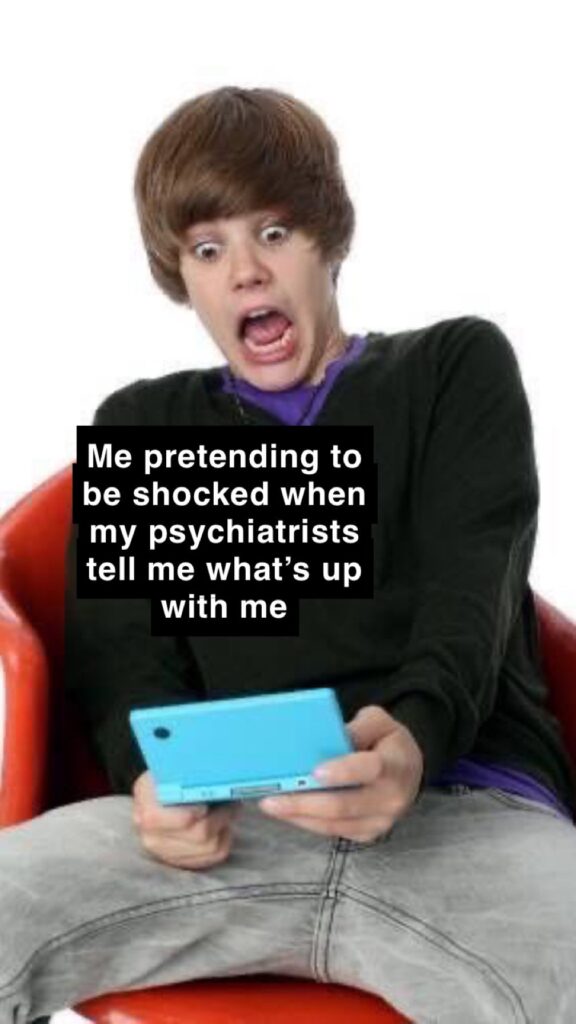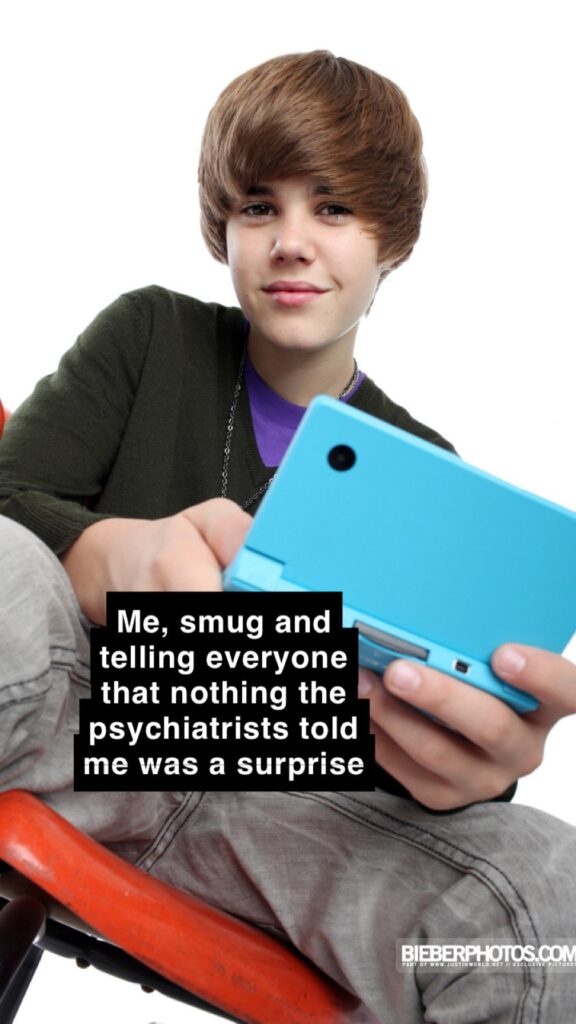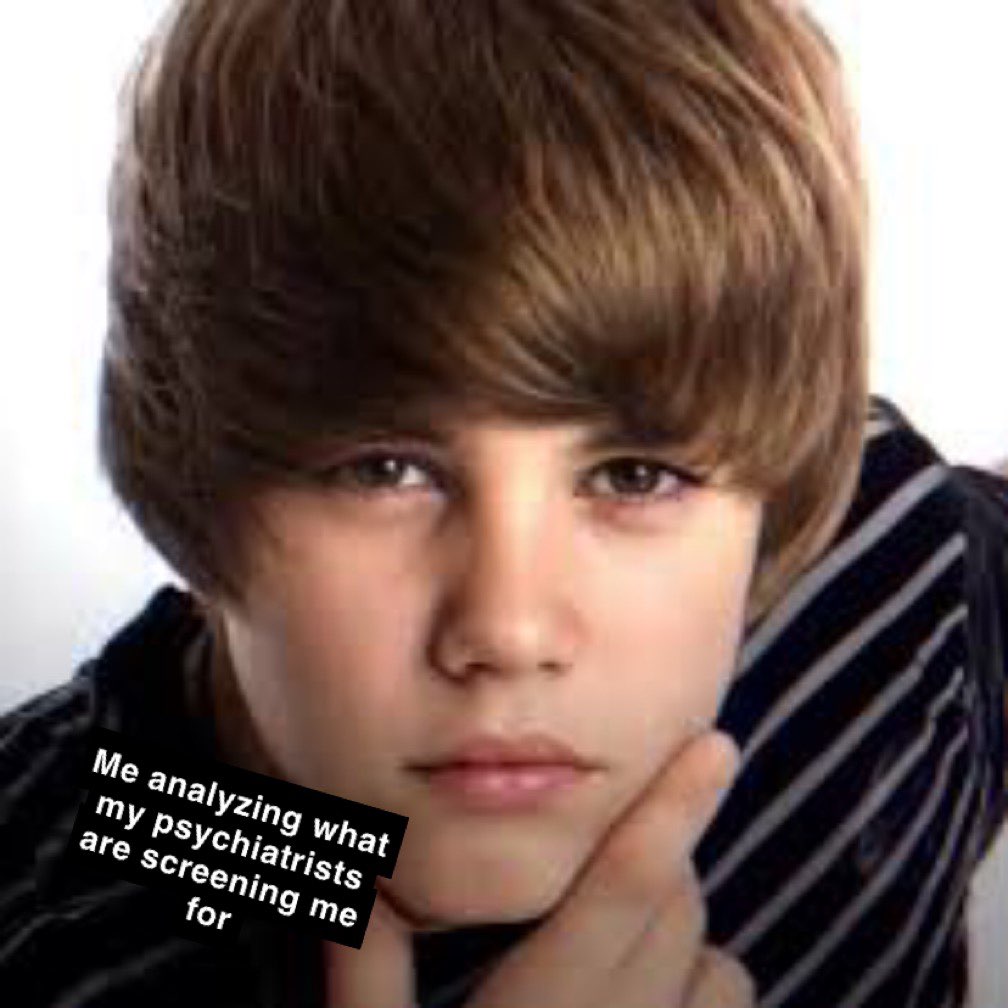Intro
Recently, I finally had my first official psychiatric assessment. Up until this point, I had only ever seen my GP about my mental health (for a few reasons, mainly the long wait times for psychiatric referrals in Canada). In the interest of transparency and sharing experiences, I wanted to take the time to delve into what exactly my experience was like. I find that often it can be hard to find detailed information about what these processes can look like, so it is my hope that sharing my own experience will help illuminate the process a bit.
A brief overview
First, a brief overview of the timeline and process. If you are interested in learning about my mental health journey up until my psychiatric referral, then you’ll find my detailed account in this linked post. However, if you’re up to speed or you’re not too concerned about the before then keep reading. Last April (2023) during a routine medication follow up with my doctor (we follow up every three months), I was finally referred to a psychiatrist. In Canada, psychiatrists are publicly funded, but require referrals to see. Approximately a week or so later, the outpatient psychiatry clinic I was referred to called me to set up a basic thirty minute intake assessment with a nurse only three days later. After this preliminary assessment I was told I would be placed on the waitlist to see a psychiatrist. I was told the wait would be two to three months, but that after a month I should call to follow up just to ensure I wasn’t lost in the system. After a month, I did just that and was offered an appointment as soon as two weeks from then. I ended up taking an appointment on June 20th to account for my schedule. Important to note, I was also asked whether it would be okay with me if I was seen or observed by a resident in combination with the attending psychiatrist. I gave my consent for this. On June 20th, my assessment was approximately an hour long, perhaps a little longer. So, across the whole process from the date of my referral, it took approximately two months to be seen by a psychiatrist. This was a majorly pleasant surprise as my GP had told me that I would likely wait six to nine months.
Initial Referral
Now the nitty gritty, a more detailed account of the process starting with the initial referral. For those who don’t know, I have been seeing my doctor on a bi-monthly and then every three month basis for a little over a year now regarding my mental health and medications. For the longest time my GP held off on sending me to see a psychiatrist due to a few factors, but mainly it was because wait times to see one are notoriously long and he thought it was more important that I was treated promptly. As such, he worked with me to maintain and care for my mental health while he was comfortable. I don’t begrudge him for this at all, in fact, I agree that it was the best course of action. Of course, I had inquired about seeing a psychiatrist nonetheless as I was interested in receiving a full and thorough assessment along with the opinion of a specialized expert. The first time I asked, my doctor said it wouldn’t be necessary for now as he could handle my care, however, if things didn’t improve or got more complicated then he would send in a referral. Well, during our last appointment in April that’s what happened. My moods, while much more balanced than before were still frequently fluctuating and I was beginning to bring up concerns of possible co-occurring conditions (in this case, ADHD). At the end of our appointment, my doctor told me that we would continue to manage my medication together in the meantime while he put in a referral that he expected would come to fruition in six to nine months.
Intake Assessment
Imagine my surprise at getting called by intake at the hospital only about a week after my doctor put in the referral. To be fair, it’s not like I knew much about the referral process so it could have been perfectly possible that they were just getting some of my information and letting me know that they were putting me in the queue for an appointment coming up about six to nine months later as my doctor told me. Nope! Instead, I was asked to book a short thirty minute intake assessment with a nurse a few days later. As I gathered, this short assessment was for the purpose of gathering some base information about my history, life circumstances, and symptoms prior to my real appointment. Thankfully, I was also given the opportunity to note and highlight any specific concerns or questions I had. Additionally, the nurse provided me with some resources I could access in the meantime to support myself which definitely made me feel more comfortable with the process as I knew due diligence was being done. Prior to the short assessment I was nervous, as I tend to be for appointments requiring me to relinquish some control of the process. Fortunately, the assessment itself was rather comfortable and easy. It was done over the phone as well which made things more convenient. Really, the best part for me was that I was able to ask questions about what the rest of the process would look like in order to ease my worry. The answers were vague, yet better than nothing. I was told the next assessment would likely be an hour long and that afterwards my medication would be reviewed following which I may have some follow up appointments to check in. At the end of our call, the nurse told me that I would be taken care of my the hospital’s psychiatric outpatient clinic and that my initial appointment with a psychiatrist would likely be in two to three months. Additionally, she mentioned I should call the clinic in a month in order to follow up and be sure I wasn’t lost among the pile of others waiting to be seen. With that, I was one step closer to the real thing.
Psychiatric Assessment
Diligently, one month later I called the outpatient clinic to follow up. I mentioned that I was referred and told to check in, so the man on the phone asked my name in order to check where things were at. To my surprise, he offered to move right ahead and book my appointment in approximately two weeks’ time. Unfortunately, I had a commitment already on the day offered to me for an appointment (my convocation actually!) so instead I booked an appointment for the week after the one first offered to me. Again, to soothe myself I intended to ask more questions, namely who I would be seeing. Luckily, the man on the phone answered before I could ask, telling me not only the name of my psychiatrist but also that the appointment was likely to consist of an hour to an hour and a half long assessment. He also confirmed with me that I consented to being observed or even assessed by a resident while the attending psychiatrist was present. Now, all that was left for me to do was to wait for the day of the appointment and oh man did I anticipate it.
Finally, only a few days ago actually, the day came. Again, I was nervous beforehand. Something about not knowing exactly what I would be asked, exactly what I would be evaluated for, and not having any real control of the situation aside from the answers I provided was a terrifying prospect for me. Yet, at the same time I was excited. Excited because finally I was moving forward and getting some hopefully official answers. Now, at this point I already had a very good idea of what was going on, but nonetheless official and expert confirmation is its own special comfort. So I set up a space for a virtual meeting and got myself all ready to go. Of course, running in the back of my mind were all the frankly terrible reviews I had found for my psychiatrist online. These reviews were SCARY, saying things like “she doesn’t listen to a word you say”, “she has a god complex”, “she diagnosed me purely based on her assumptions without taking my actual words into account”, and “she slapped me with a BPD diagnosis, despite it not fitting for me at all”. Frankly, these things got directly at my greatest fears. To be clear, there is absolutely nothing wrong with having or being diagnosed with BPD, but it’s an undeniably stigmatized diagnosis that I didn’t want misdiagnosed. Now, if it turned out to just be true then no problem. Once I got into my appointment I found that I would be assessed by the resident psychiatrist while the attending remaining in the call (muted and camera off) to observe. This eased my fears right away because it meant the psychiatrist with the concerning reviews was only there to observe rather than assess me herself. Of course, she would still form and give her own opinion, but not being directly interviewed by her was calming. The assessment took place over slightly more than an hour and was essentially an incredibly thorough interview. I was asked many questions about my symptoms, my relationships, my lifestyle, my history (including experiences in school, when I first noticed any mental health struggles, etc), and more. I was impressed and glad to answer every question. Fun fact about me, I honestly love being assessed. Why? Well for one I just like to talk about myself and answer these questions. Not only that though, the prospect of being told who I am or what’s up with me is exciting and frankly, abnormal psychology is one of my special interests. Any time a question was asked about if I had specific symptoms, due to my interest in the subject, I would know EXACTLY what the question was getting at and what I was being evaluated for. This knowledge gave me comfort in that it gave me a measure of understanding and control over the situation that I know most people do not have. After the interview portion of the appointment was done, and actually in the interest of time I had to be cut off in one of my answers since my responses are always thorough, I received feedback and a plan of action from both psychiatrists. Essentially, the resident shared her findings and the attending confirmed her agreement and offered some elaborations.
The Findings and Feedback

None of what I was told by the psychiatrists really surprised me. Unfortunately, there was not enough time to assess for potential ADHD and I was told that an assessment for that would be much more intense anyway, including report cards and likely interviews with loved ones. Besides, they said that it would be difficult to get at if I had it or not at present because my moods would cause overlapping symptoms. Not only that, but they said if I had it then it was likely quite mild as I clearly was coping with it quite well (you know, cause I could hold a job and made it through school fine). I have my own qualms with that overgeneralization only because I know “high-functioning” isn’t really a thing and people have lots of ways to compensate for their struggles. I, in particular, always mask my problems and care for myself. Further on ADHD, if I have it then behavioural strategies would be the likely treatment since stimulant medications risk triggering mania. Not to say no one with bipolar disorder and ADHD is ever treated with stimulant medications, but it’s sort of a risk/reward situation. Ultimately, I was told I presented with clear signs of Bipolar Disorder (type 2). This was because I had experienced clear episodes of both major depression and hypomania. They mentioned that it sounded like my experiences of hypomania were so far on the mild end, but also that I was young and they commonly see people experiencing their first stronger mania around the age of thirty. An important thing to know about Bipolar Disorder is that it is degenerative, it just gets worse with time. With every episode you have, you risk getting worse. Medication helps to manage that and slow that process. As such, the plan was to increase my dose of an anti-psychotic in the interest of getting my moods even more reigned in in order to prevent worsening of the illness. On top of having Bipolar 2, they told me it seemed I also had experiences consistent with Generalized Anxiety Disorder. Fortunately, due to both my therapy and medication, it seemed my GAD was in remission. Even further, I was told that I had traits consistent with Borderline Personality Disorder just not enough to warrant a diagnosis. This was interesting to me and the only things slightly surprising, though still not by much. I now find myself researching more about BPD and its subtypes to decide whether I relate to it. On my BPD traits, the psychiatrists told me it could be helpful to try Dialectical Behavioural Therapy or at the least, a DBT workbook. Oh but folks, that’s not all. They mentioned it seemed as if I also had experiences and traits consistent with Autism Spectrum Disorder. Unfortunately, they were not able to truly assess and diagnose ASD, but that it was up to me whether I decided I wanted to seek out diagnosis through private (and quite expensive) means. I was told that often diagnosing ASD in adulthood doesn’t provide any resources or change to treatment, and thus it would be a personal decision to have it formally diagnosed. However, the psychiatrist said that she was entirely okay with (and even supportive) of people self-identifying (or self-diagnosing) as autistic. As such, that is what I will do because I’ve already been doing it. Finally, they noted that they suspected I was also Gifted, but that again it would require private psycho-educational assessment to officially confirm. After this assessment, I was told I would increase my dose of my anti-psychotic as I previously mentioned while staying on my antidepressant. In July, I will have a follow up appointment to check on the success of my meds.
Conclusion
Ultimately, nearly nothing that I was told (aside from maybe a bit about BPD) was surprising or unknown to me. In fact, I found it rather awkward having to pretend as if I was surprised to hear or not as knowledgeable as I am. Despite already anticipating the results of my assessment, I believe it was incredibly valuable. Why? Because the validation of suspicions being confirmed officially by experts is powerful. I now feel definitive in what up with my strange burnt chicken nugget ass brain. I’m so grateful to have the privilege to access the care I do and I’m truly so happy to have made it to this point when a year ago I had no idea what was going on with me.

